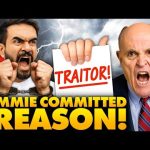In the bustling streets of New York City, the political landscape is heating up, and not just because of the summer sun. A new star is rising on the left: Zohran Mamdani, a self-proclaimed “democratic socialist” whose ideas have sent shockwaves through conservative circles. This is an individual who boldly claims to have a better grip on capitalism than traditionalists do. Alarm bells are ringing in Republican quarters as they label him a ‘communist.’ After all, the very idea of someone like Mamdani influencing policy in New York sends shivers down the spine of many staunch conservatives.
Mamdani has stirred the pot with his radical proposals. Perhaps most significant is his push to defund the police, replacing them with what he calls “gun violence interrupters.” It seems his vision is to create a safer community, not through traditional law enforcement, but rather through a hodgepodge of social measures. This concept raises eyebrows—how exactly a “gun violence interrupter” will function is anyone’s guess, but Mamdani is adamant that it’s the way forward. From a conservative perspective, this looks less like a solution and more like a recipe for chaos.
He hasn’t stopped there. Mamdani’s housing plan reportedly suggests shifting the tax burden from homeowners in less affluent areas to wealthier neighborhoods, especially those inhabited by, let’s say, whiter demographics. This component has struck opponents as not just flawed but downright discriminatory. Critics argue that he is not just advocating for wealth redistribution, but potentially employing race as a basis for taxation. It seems that for Mamdani, the wealthiest white neighborhoods should bear the brunt when it comes to footing the city’s financial bills. To some, this appears to be a glaring admission of how divisive his policies may really be.
Curtis Sliwa, conservative candidate for New York City Mayor and founder of the Guardian Angels, has been vocal in his opposition to Mamdani’s ideology. He portrays Mamdani as a full-throttle communist, warning voters that such radical reforms would cripple the city. Sliwa’s approach also highlights a critical point: What does it mean for a candidate to propose sweeping changes without a solid understanding of law enforcement and community dynamics? For Sliwa, as someone who’s devoted his life to public safety, handing the keys of the city to those who favor defunding the police is like giving a child a loaded toy gun—dangerous and irresponsible.
During recent discussions, Sliwa made it clear that the backbone of New York City lies with the working-class citizens often found in subway cars, a melting pot of views and needs. He champions the cause of protecting and uplifting these voices, which is a stark contrast to the elitist policies Mamdani appears to endorse. It raises the question: Who truly represents the people of New York City—the radical reformers or the candidates with street-level experience and a commitment to law and order?
Ultimately, as the election season heats up, the battle lines are being drawn. Some see Mamdani as a revolutionary voice of change; others view him as the tip of an iceberg that could plunge the city into disarray. As New Yorkers prepare to cast their votes, they will need to consider what version of the future they want for their iconic city. Will they lean towards radical reform, or will they choose leaders who promote safety, order, and a diverse community that can thrive without mandatory class warfare? Only time will tell how this narrative unfolds, but one thing is for sure: New York City politics is as lively as ever.




